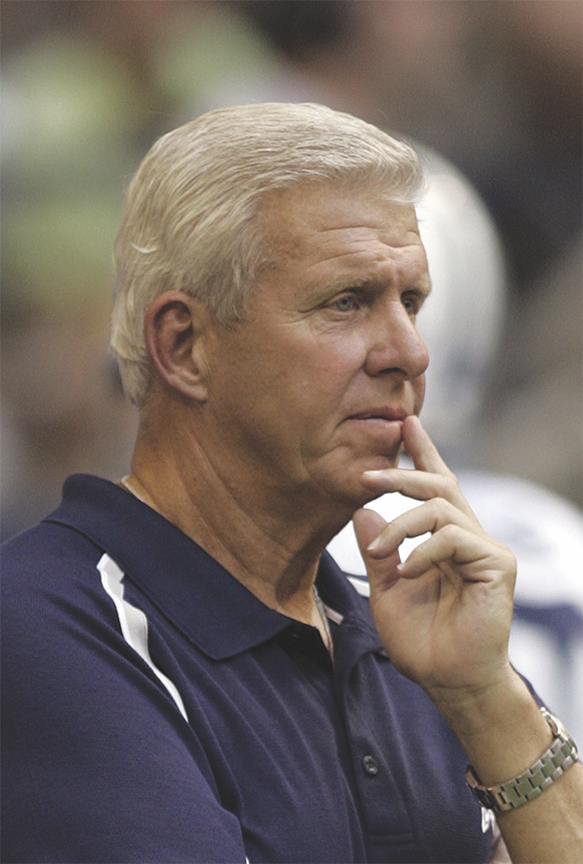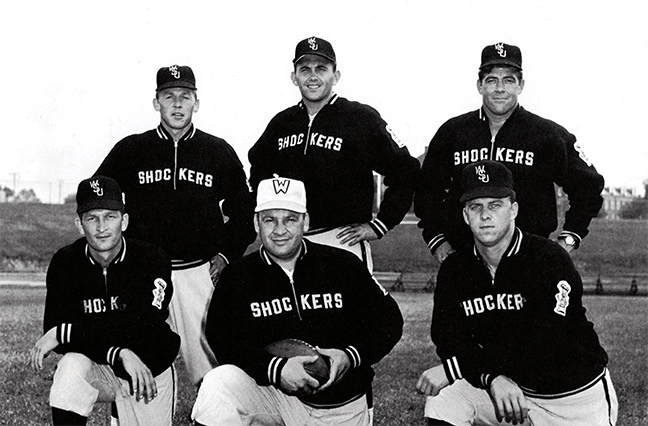
Veteran National Football League coach Bill Parcells ’64 has faced down the demands and uncertainties of hundreds of high-pressure game days — and come away with a reputation for winning.
“I know football isn’t important to mankind, in the big picture,” Parcells commented during an interview on the occasion of his being named the 1995 WSU Alumni Achievement Award honoree.
“But any time you’ve been to the top in a highly competitive industry like football, you know how hard it is to get there. There’s a tremendous price to pay, and good fortune has to nurse you along. But once you’ve won on that level, you want to keep winning.”
Parcells’ 174 career victories make him the second winningest active coach in the NFL; he trails only Marty Schottenheimer.
Parcells has led his teams (the New York Giants, the New England Patriots, the New York Jets and the Dallas Cowboys) to 12 winning seasons, nine playoff berths and posted an 11-7 postseason record.
Parcells-coached teams have finished in either first or second place in their division 10 times.
With the Cowboys’ postseason appearance in 2003, he became the first coach in NFL history to lead four different teams to the playoffs.
He is one of only five coaches (Don Shula, Dan Reeves, Dick Vermiel and Mike Holmgren) to lead two separate teams to the Super Bowl.
Parcells, Denver’s Mike Shanahan, Washington’s Joe Gibbs and New England’s Bill Belichick are the only active coaches to claim two or more Super Bowl titles — and Parcells stands as the only NFL coach, active or otherwise, to have played football at the University of Wichita, having been lured by a football scholarship in 1961.
Here is The Shocker's 2006 interview with Coach Parcells:
Q: What special memories do you have from your playing days as a linebacker at Wichita State?
A: “Well, I didn’t play linebacker the whole time, but I enjoyed my time at Wichita. It was a good place to be at the time I was there. The most vivid recollection I have of being there was unfortunately the assassination of President Kennedy during the fall of my senior year. We canceled one of our games because of that. That was kind of a sad set of circumstances for me, but I enjoyed being there very much and enjoyed the college experience — and I still have a lot of friends who were on those teams.”
Q: Describe yourself as a football player.
A: “I would say I was an average player who was lucky enough to make All-Missouri Valley once. I was proud of that, but I would say that I was an average player.”
Q: After starting your playing career at Colgate, what circumstances brought you to WSU?
A: “That is a good one, and I don’t know that I have the answer. I would say probably wanderlust. I had some friends in Wichita that were playing and guys I went to school with. I just ventured out there and although I may not have done everything as a college student I could have done academically, I kind of regret that I was a little bit lazy. I was able to graduate, and I think I was better served for being in school there. I returned to campus this summer and I looked at some of the new facilities and things and got an idea of where the school is now. So that was nice to see as well.”
Q: We heard that you and your friend Bob Long used to sling pizzas at a Pizza Hut near campus. Any funny or interesting anecdotes from that job?
A: “That is a true story. It was at 17th and Hillside, and Bob and I used to sell pizza there every Sunday night. We worked in the restaurant, and we did that for a couple of years together. He was one of my teammates, and he later went on to play and have a good pro career in the NFL with the Packers, Falcons and Redskins.”
Q: Serving as defensive line coach at WSU was one of your first coaching experiences. How did you get the job? What did you learn that helped you later in your career?
A: “I got the job because one of my coaches at Wichita when I was playing was named the head coach — George Karras. I had started my coaching career at a small school in Nebraska at Hastings College, and George offered me the job to go back to Wichita. I was happy to take it. Well, I was in my formative years as a coach, and I had a lot to learn. Just dealing with the players from the coaching end as opposed to the playing end was a lot different for me. Learning how to structure plans and practices and all of the things a young coach would learn without ever really being on the inside. I enjoyed it very much.”
Q: How closely do you follow WSU sports these days?
A: “I do try to keep an eye on basketball and baseball particularly. They have some baseball accomplishments that are very noteworthy, and I was happy to see that the basketball team was able to get into the NCAA Tournament this year. I kind of follow it, maybe not as closely as I should.”

Detroit Lions’ seventh-round draft pick, but opted to accept
an assistant coaching position at Hastings College in
Nebraska. After a year, he returned to WSU to assist head
coach George Karras (front row, center). Other assistant
coaches are (back row, left to right) Dick Johnson, Jim
Mattox, Bill Turnbow and (front, far left) Gary Wyatt.
Parcells, who won NFL Coach of the Year honors in both
1986 and 1989, is also the author of Finding a Way to
Win (1995).
Q: Bob Long said one of your greatest strengths is that you are loyal — as a coach and as a friend. How important has loyalty been in your career?
A: “It was pretty much ingrained in me that loyalty is an important part of not only your people fabric but also your professional fabric. I am flattered that Bob would say that, and he has been a good friend for many years. I just hope I have a few more that feel that way.”
Q: What advice would you give college students to help them succeed?
A: “Success is never final, but failure can be.”
Q: You have coached many star players. But what player, who wasn’t a great athlete and never became a household name, did you love coaching because he worked hard and reached his maximum potential?
A: “I have had several of those. Maurice Carthon is one of them; he is the offensive coordinator of the Cleveland Browns now. He formally worked for me with the New York Jets, the Patriots and here in Dallas. Young man named Corwin Brown who is now the secondary coach for the Jets and who I have a high regard for. Another fellow named Sam Gash. They are all in coaching now. They seem to follow the foot paths that we kind of helped them get started on, so I am proud of them. Those were some guys who were pretty much overachieving-type players that were the kind that every coach likes to have.”
Q: You have been described as a master motivator. What is the key to motivating pro football players?
A: “Motivation is overrated. The key to motivation is having a subject that is willing to be a self-starter. Hopefully, if you can provide the direction — it is not a motivation — and the advice for that particular person, then he would take it and use it and begin to develop it. As you go with that subject you gain the opportunity to add, embellish and develop not only a relationship but also a pattern of learning. Once the players feel like they can trust you and rely on you for that, you can talk in less-than-tense situations and out of the emotions of the game. A lot of the best information is gathered when the pressure is off rather than on. But motivation is difficult if the person is not a self-starter.”
Q: You have dedicated much of your life to football, so what was it like to achieve the ultimate prize and win the Super Bowl for the first time?
A: “For one shining moment you are on the top of your profession and it is something that they can never take from you. It is something that you relish for a long time. No one can ever tell you that you couldn’t do it because you did it and that is a gratifying set of circumstances. Unfortunately, once you do it, for a Type A personality like myself, then you want to prove that it wasn’t a fluke and you want to do it again. There is really no end to that cycle, unfortunately. I think if I had never won anything, I would have been a lot better off mentally than if I had.”
Q: Today as coach of the Dallas Cowboys, what keeps you excited and motivated about the game of football with this team?
A: “The same things that always did. It is fall and it is football. The scrutiny and the pressure of the job are greater than they have ever been. I am at an age now that I know that my longevity is not going to be forever, but I feel fortunate and blessed to have had the opportunity to do it as long as I have. I still enjoy it and I still enjoy being around young people very much, and it probably does a lot for my own well-being as well.”
As a Shocker…
New Jersey native Bill Parcells enrolled at the University of Wichita in 1961. He was one of a number of athletes from the northeast United States recruited by Shocker head coach Hank Foldberg.
Parcells joined the Shockers as a quarterback, but was moved to tackle and helped his 1961 teammates post an 8-3 record, capture the Missouri Valley Conference title — and travel to the Sun Bowl in El Paso, Texas, where the Shockers lost to Villanova 17-9. The next two seasons, Parcells started every game. WSU finished the 1963 season as MVC co-champion, and Parcells was named to the all-conference team.
A three-year letterman (1961, ’62 and ’63), Parcells graduated from Wichita State with a degree in physical education in 1964. In 1996, he was inducted into the Pizza Hut Shocker Sports Hall of Fame.





